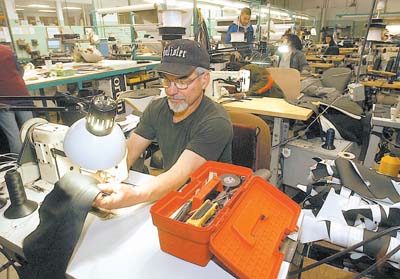
It’s commonplace for civic leaders to badmouth the way the state
treats small businesses, but now they have something to backup the
claims: A research group recently ranked California 48th in the
nation in labor performance.
By Danny Bernardini, McClatchy News Service
It’s commonplace for civic leaders to badmouth the way the state treats small businesses, but now they have something to backup the claims: A research group recently ranked California 48th in the nation in labor performance.
The Pacific Research Institute on Wednesday released “California Prosperity: Assessing the State of the Golden State,” created by Jason Clemens, PRI director of research, and Robert P. Murphy, a senior policy fellow.
That report looks at the sample years 2002 to 2006 and ranks California 24th among all states in its ability to expand the economy, in the bottom 20 for private-sector employment growth, in the bottom 20 for the length of unemployment and in the bottom 20 for the average unemployment rate.
PRI defines labor performance as a combination of the rankings in the categories of private-sector employment growth (33rd), private sector employment as a share of total employment (42nd), unemployment rate (43rd) and the duration of unemployment (38th).
The report was released the same day the California Chamber of Commerce and business organizations delivered the Agenda for Economic Recovery to Gov. Arnold Schwarzenegger and the Legislature.
Those talks focused on creating a partnership between state and local leaders to share ideas on improving small businesses, stopping the quashing of bills that promote economic health and getting rid of restrictions that are prompting companies to move out of state.
In the category of domestic migration, California ranked 44th, according to the report. That’s a stark comparison to neighbors like Nevada (1st), Arizona (2nd) and Oregon (12th).
For Gary Tatum, president of the Vacaville Chamber of Commerce, the statistics are not surprising.
“The state Legislature is not business-friendly. Most of the people in Sacramento have never run a business — they are specialists in the environment and government,” Tatum said. “The state is out to save the state. They’re not out to save businesses.”
He said it’s common for laws to be passed that tax or restrict businesses with a certain amount of employees. Tatum said these laws force small businesses to either lay off employees or not to hire.
“What company with 18 employees is going to go to 20 if it means being taxed extra?” he asked rhetorically. “If they would turn around and say, ‘We’re going to reduce taxes,’ there will be less burdens and businesses would hire more people. When you hire people, the unemployment reduces. When that happens, taxes increase. It’s a simple formula, it’s not rocket science. As soon as those people are employed, they are paying taxes.”
As for why bigger corporations are leaving or deciding not to expand in California, Tatum said that’s simply an issue of balancing the books. When the owner’s of corporations are in other countries, Budweiser in Belgium (InBev) and Genentech in Switzerland (Roche), for example, there are fewer worries about upsetting a local economy, he said.
“They can go elsewhere and get the job done cheaper,” Tatum said. “They don’t care about what happens to the community, they care about the bottom line.”
It’s not all doom and gloom, however, for Mike Ammann, president of the Solano Economic Development Corporation in Fairfield. He acknowledged the problems throughout the state, but also stressed the 24 percent growth of individual business owners in Solano County for the years examined in the study.
Ammann said that, while there are problems, the population in California will continue to increase and that also means businesses will come to serve those people. He said other states in the Midwest have to deal with a large percentage of residents leaving as entire industries shutter their doors for good.
“It’s a growing market — people are going to come here or start businesses. If you’re a global company, you want to supply that market,” he said. “You can’t always do that by building a warehouse in Nevada.”
Not having read the report thoroughly, Ammann said he couldn’t comment on specifics, but said it is easy to pile on state leaders right now.
“State government isn’t held very highly right now,” he said. “I try and separate the political theater from what the business climate really is. I’m sure we can pick out some and say how terrible it is, but we have a lot of other things we can talk about with pride.”
Ammann said he is confident with the amount of professionals and capital in Northern California, that it will survive.
“I’m far from saying we’re perfect. But we have very talented people. You just don’t re-create that anywhere else,” he said. “We still have more venture capital in Northern California in comparison to countries, let alone other states. Even with all the theater you see every day.”








